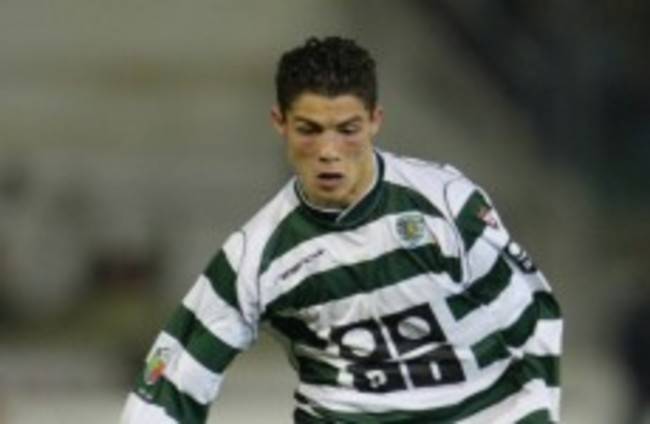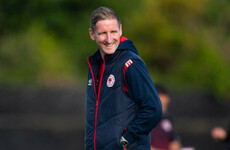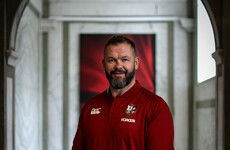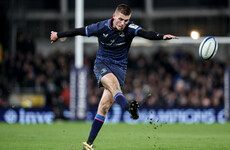Updated at 13.12
WHEN CRISTIANO RONALDO made his earth-shattering £80 million move to Real Madrid in 2009, the Portuguese was lavishly presented alongside Madrid’s record nine European Cups.
The allusion was clear: Ronaldo was tasked with bringing La Décima, Florentino Pérez’s obsession, to the Santiago Bernabéu.
Five years on, if Ronaldo fires Los Blancos to glory in Lisbon, the 29-year-old will cement his place in an exclusive pantheon of Madrid greats alongside the likes of Alfredo Di Stéfano and Raúl.
Now long established as one of the greatest players of his generation, Ronaldo is far from the leggy teenager that tore up bylines across Portugal with his mesmerising stepovers.
Yet, there is a poignancy in Ronaldo’s return to the Portuguese capital – even if it’s to Benfica’s Estádio da Luz. So often ridiculed for his self-obsession in recent years, whether it be wealth or individual records, the Portuguese’s time at Sporting Lisbon was one of real sacrifice.
Born to poverty on the remote island of Madeira, Ronaldo’s only chance of bettering his family’s life was through his prodigious ability and the youngster departed for Lisbon at just 12 years of age.
Bullied by some of his teammates for his thick coastal accent, Ronaldo persevered and, in pursuit of his dream, even underwent delicate surgery for his racing heart at the age of just 15.
With the likes of Hugo Viana and Ricardo Quaresma having already graduated into the first-team, under László Bölöni, Ronaldo’s determination and dazzling displays as a centre forward were not going to go unnoticed.
“In my spare time as coach of Sporting, I watched the youth teams,” Bölöni told TheScore.ie.
“Ronaldo was in the junior team in 2002 and was only 16. Having watched one of his training sessions and a game he played, I soon realised what he could do with the ball. The next day, a lot of our players were on international duty so I called up four or five young players for a training session. The youngest, among them, was Cristiano.
“He was a number nine for the youth teams, because his technique was already very good and he was physically strong in his age group. But, with all those man markers he would face with us in the first-team, it would have been too much for him. So, I decided to push him out wide to the right-wing and it soon proved the correct decision as he was able to showcase his ability – even in this new position. He had a good fighting spirit and was able to score, so he was well on his way already.
“Cristiano was a new face in the dressing room and though he was quiet, he didn’t have a problem and was happy. It was nothing special to him, and he had a very strong personality. He was quick, had fantastic technique, and could do magical things with the ball. Everything was so natural for him. His biggest quality, though, was his love of the game and he made so many sacrifices on and off the field.
“Even in training, you could see the pleasure he had in doing different exercises — whether it was crossing or aerial challenges with Mário Jardel. For him, it was all so easy because of his fantastic technique. By the end of training on that first day, with all the different drills and objectives, I discovered a young player who was already an adult. He was only 16, but already his ability was fantastic. After another session, I spoke with the club and promoted him: he was ready to play games for the first-team.”
Far from an orthodox striker, Ronaldo was blessed with extraordinary skill and pace – which made his redeployment to the wing a seamless transition.
Owed much to years of being the centre of things for Sporting’s youth teams, Ronaldo retained his trademark selfishness in tandem with his thirst to thrill spectators on the flank.
“My biggest problem was to stop his dribbling. It wasn’t because I didn’t like it; in our system, he was in the midfield and you can’t make a mistake and lose possession. But, we once played a friendly against Celta Vigo and he lost the ball on the halfway line. I thought it would be too far, but I still shouted at him and he understood and chased the player back with a huge sprint. He saved the situation. I immediately understood that tactically he was already ready.”
Such was Ronaldo’s instant impact, the 16-year-old scored a brace on his league debut for Sporting, against Moreirense on 7 October 2002.
Remarkably, Ronaldo became the only player in Sporting’s history to play for the club’s under-16, under-17, under-18, reserve, and first team in one single season.
“Soon journalists began asking me, ‘Who is Ronaldo?’ ‘What do you see in him?’ ‘Will he play in the next game?’ There was already a lot of pressure but, outside of Sporting, no one really knew who Cristiano Ronaldo was when he first played. Five games in, to the outside world, he was just a young player who had been called up to the first-team but I told them he could go on to become as good as Eusébio and Luís Figo.
“The next day, my lawyer – who’s a Benfica fan – called me and he was very angry with my statement! In Portugal, there are two gods: Amália Rodrigues, the fado singer, and Eusébio. I compared this ‘nobody’ with Eusébio, but I knew Ronaldo could do it. I made a bet with my lawyer that if Ronaldo made it, he owed me a bottle of champagne. I think I better give him a call!”
With his representatives having previously met with Arsenal, Liverpool, and Barcelona, it was Manchester United and Alex Ferguson who prized Ronaldo away from the Estádio José Alvalade.
In typical Ronaldo style, Ferguson’s £12 million bid was only triggered after the Portuguese wowed his future United team-mates with a scintillating display in a 3-1 friendly win against the Red Devils.
Despite initial reservations about his diving and play-acting, Ronaldo went on to score 118 goals in 292 games in six seasons for United – winning nine trophies in the process.
A then world record £80 million move to Real Madrid followed in 2009 and the Portuguese now finds himself returning to Lisbon to contest his first Champions League final in six years.
Homecoming
Bölöni will be among millions of captivated viewers, having kept in touch with Ronaldo and even been invited to the Portuguese’s first Ballon d’Or win in 2008.
“I have a few reasons to support Real Madrid, because, as well as Cristiano, I previously worked with Pepe for a short time at Sporting Lisbon and Raphaël Varane at Standard Liège. I can say that I’ve three players playing for Real Madrid, so it’s normal for me to want them to win. It’s in Lisbon, so I’m sure there’ll be even more pressure on Ronaldo. But, he’s already got so much mental strength that I’m sure it won’t affect him. I wish him all the best.”













His champions league stats for Real Madrid are 16 goals in 10 games this season and 51 goals in 50 games overall. Phenomenal stuff
People love the whole “Messi and his rise from the slums of Argentina story” but Ronaldo done it the hard way too, great player just hope he`s fit tonight
best player of all time.
Best player since Maradonna.
Lads thats would be messi.
Messi seems to get a lot more credit than Ronaldo but that might be because of teams he plays with, usually if you don’t follow Man Utd or Real you hate them, excellent player and he’s up there with any great player in the last 20 years
Ive watched and seen them both a few times but for me, Messi just about shades it. And im a utd fan. To me ronnie was a god but messi is just better
That’s a very good point.. people tend to hate United and Real if they don’t support them.
They’re totally different players, it’s not really fair to compare them! A point that needs making is that Ronaldo could play in any team in the world, whereas Barça have built a system around Messi! Just my opinion
And you don’t think Real have built their system around Ronaldo? I always thought Messi was the better of the two but Ronaldo over the last two years has been immense
This is a story when Cristiano Ronaldo was little and he was still a nobody. He and his friend were vying for a spot in an academy of Andorinha in Funchal, Madeira.
“I have to thank my old friend Albert Fantrau for my succes. We played together for the same team in the U-18 championship. When a scout came to see us he said that : “Who score’s more goals will come in our academy”.
“We won that match 3-0. I scored the first goal then Albert scored the second with a great header. But the third goal was impressive for all of us.
Albert was 1 on 1 against the goalkeeper , he rounded the goalkeeper and i was running in front of him.
All he had to do was to score that goal but he passed it to me and i scored the third goal , so i got that spot and went to the academy.
After the match i went to him and asked him why ? .. he said that “Because you are better than me”
Journalists then went to Albert’s house and asked him if it was a true story. He said yes.
He also said that his career as a player after the match ended and now is unemployed.
“But how did you build this house so great, you have a car? You seem like a rich man. You also able keep your family .. From where did this come from? ‘
Albert more proudly replied: “It is from Ronaldo! ”
Viva Ronaldo